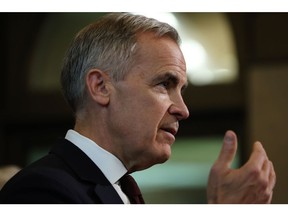
Article content
(Bloomberg) — Canadian Prime Minister Mark Carney said he believes trade negotiations with the US will “intensify” but acknowledged there’s little evidence the Trump administration is willing to cut a deal that would completely drop tariffs.
THIS CONTENT IS RESERVED FOR SUBSCRIBERS ONLY
Subscribe now to read the latest news in your city and across Canada.
- Exclusive articles from Barbara Shecter, Joe O'Connor, Gabriel Friedman, and others.
- Daily content from Financial Times, the world's leading global business publication.
- Unlimited online access to read articles from Financial Post, National Post and 15 news sites across Canada with one account.
- National Post ePaper, an electronic replica of the print edition to view on any device, share and comment on.
- Daily puzzles, including the New York Times Crossword.
SUBSCRIBE TO UNLOCK MORE ARTICLES
Subscribe now to read the latest news in your city and across Canada.
- Exclusive articles from Barbara Shecter, Joe O'Connor, Gabriel Friedman and others.
- Daily content from Financial Times, the world's leading global business publication.
- Unlimited online access to read articles from Financial Post, National Post and 15 news sites across Canada with one account.
- National Post ePaper, an electronic replica of the print edition to view on any device, share and comment on.
- Daily puzzles, including the New York Times Crossword.
REGISTER / SIGN IN TO UNLOCK MORE ARTICLES
Create an account or sign in to continue with your reading experience.
- Access articles from across Canada with one account.
- Share your thoughts and join the conversation in the comments.
- Enjoy additional articles per month.
- Get email updates from your favourite authors.
THIS ARTICLE IS FREE TO READ REGISTER TO UNLOCK.
Create an account or sign in to continue with your reading experience.
- Access articles from across Canada with one account
- Share your thoughts and join the conversation in the comments
- Enjoy additional articles per month
- Get email updates from your favourite authors
Sign In or Create an Account
or
Article content
“We need to recognize that the commercial landscape globally has changed,” Carney told reporters in Ottawa prior to a closed-door meeting of his cabinet on Tuesday. “We will continue to focus on what we can most control, which is building a strong Canadian economy.”
Article content
Article content
Article content
In June, Carney’s government announced it would boost defense spending this year and scrapped a digital services tax that would have cost US tech giants billions of dollars, meeting two demands US President Donald Trump had put to Canada. The prime minister said the two countries would aim for a broader trade agreement by July 21.
Article content
By signing up you consent to receive the above newsletter from Postmedia Network Inc.
Article content
Then, on July 10, Trump posted a letter to Carney threatening to impose 35% tariffs on Canadian goods by August 1. The letter made no mention of the Canadian federal government’s efforts to ramp up expenditures on defense and border security, nor its decision to eliminate the digital tax.
Article content
A poll by the Angus Reid Institute released Tuesday found that 84% of Canadians don’t believe that Trump and his officials will “negotiate in good faith.” Only 11% said they are confident they’ll negotiate fairly.
Article content
White House officials have said the 35% tariff, if implemented, wouldn’t apply to goods shipped under the US-Mexico-Canada trade agreement that are currently exempt from US tariffs that went into effect in early March.
Article content
Since his return to power in Washington, the president has sidestepped that continental trade accord to place or announce import taxes on foreign steel, aluminum, cars and copper.
Article content
Carney told reporters that “a strong Canadian economy, to be absolutely clear, includes a strong steel industry. It includes a strong Canadian auto industry, a strong Canadian aluminum industry, and copper industry and others. And we’ll be focused on what we can do to support that.”
Article content

.jpg) 6 hours ago
1
6 hours ago
1
 English (US)
English (US)